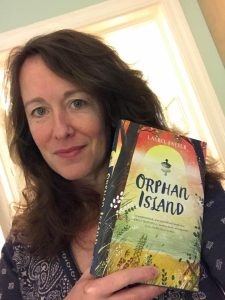I am a box office manager at a theater. Most of the time, I can handle everything with ease – maybe do a little playwriting during a shift, maybe get in a little reading – loved A Gentleman In Moscow – EXCEPT for twice a year when there is a Children’s Show.
The Youth Show has always had about 20 to 25 children in it – the current production has 36, ages 8 to 14 years – and they are wonderful. They work very hard with energy and joy, shepherded about by a few teenagers, and they continue to amaze me. During the rehearsal period, which uses the entire theater – the rehearsal room, the patio, the auditorium and the lobby, I can hear incessant drumming and lines read and songs sung and one day, somewhere in there, enjoyed the synopsis of Titus Andronicus on someone’s phone – EEW, SO GROSS! Later on, I found out 13 facts about Frederick Douglas because one of the girls was writing a paper on him and my computer was up and running. A small girl told me that 2 negative minus 2 negative is 2 positive. Who knew?
The children are supported by their exceptionally hard working and cheerful parents who build the sets, make the costumes, do the makeup, serve the food and clean up and on and on. And it’s all volunteer.
However, I don’t know if most people know this, but children have not only parents and grandparents but uncles and aunts and school teachers and school friends and neighbors and most of them want to come to one or two or three of the shows or maybe to all of them. Some people will reserve 20 tickets at a time. But the parents who book the tickets are dealing with people who change their minds!
And even though we have listed only 70 seats a performance on the online site – an inefficient operation called Ticket Leap – so that we won’t sell out, when those are gone, the rumor immediately goes round that the show is SOLD OUT even when there are 125 seats in the theater. The parents’ pain is palpable. NO!!!!
I am in a booth that is open to the lobby and inevitably when I come in to work, a parent will follow me. I can be taking off my jacket, putting down my purse, opening the place up and someone will say to me, “I know you’re not open yet but do you have two tickets for the Sunday matinee? Ideally, I’d like four.” There will be somebody behind her who says, “Isn’t that show sold out?” and the first person will say, “How would she know? She’s not even open yet!” And I will say, “That show is sold out,” and will hear “You’re kidding me. Right?” Wrong.
The lobby is adjacent to the box office – there is no door or window separating it – and the crowd is LOUD so that the person shouting through the box office window at show time from outside can’t be heard. Over the years, I’ve become somewhat adept at lip reading but am not always sure what’s been said. Opening night is the most chaotic but you would think after the searching for seats and the fear that we won’t have enough, that everybody would be in and happy by at least ten minutes after curtain – when someone will rush in from the auditorium and demand an answer to “So when did we allow reserved seating?!!!!”
After a stint, I lie in bed, thinking about the Monarch Resort Hotel in Pacific Grove just a block from the sea. I’m there, with my husband, watching the flickering embers from the room fireplace and contemplating the May arrival of the Monarch butterflies, which will fill an adjacent lot – thousands of them – none making a sound. It’s a beautiful dream, broken only by the sound of my husband, who teaches school, muttering in his sleep. “Sit down,” he barks.













